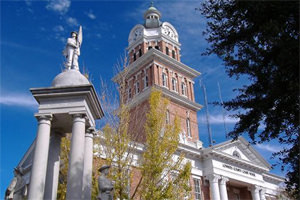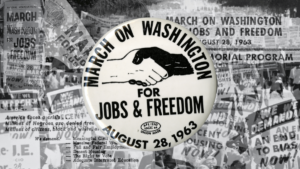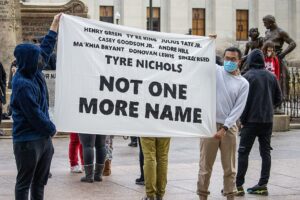Resistance, Acquiescence and My Friend J. Edgar Hoover
Three moments -- 1911, 1964, now -- coming together compelled me to think about when and why people resist power, why they acquiesce, and why, sometimes, they may believe they are resisting when they are in truth acquiescing. If it is so self-evident that the Triangle Army was compelled to say “enough is enough” back then and act on that resolve, what has happened now?
People are alarmed and demoralized by the results of the midterm elections. They should be. In my case they happened just as I was preoccupied by two other strikingly different experiences. The first had to do with my speaking and writing about the tragic Triangle Waist Factory fire, the 100th anniversary of which will be commemorated this coming March. The second was a trip to Mississippi, a personal commemoration, so to speak, of my time there as a civil rights activist in the summer of 1964 and after.
The election returns began dribbling in during my interminable flight back north from Jackson, Miss. Those three moments — 1911, 1964, now — coming together like that compelled me to think about when and why people resist power, why they acquiesce, and why, sometimes, they may believe they are resisting when they are in truth acquiescing. Also, it all made me wonder about the tenacity and frailty of memory — my own, to be sure which is Swiss cheese-like, but the country’s cultural memory as well, which has displayed a tendency toward amnesia that is and always has been breathtaking.
Even in our United States of Amnesia, we remember the Triangle Fire, in which 146 young immigrant workers, most of them women, working in a garment factory, burned and jumped to their deaths on a March day in New York City in 1911. The shock waves from the catastrophe reverberated around the country. A hundred thousand people filed by the mortuary on “Misery Lane.” Four hundred thousand grieving, angry people marched behind a horse-drawn empty hearse in a solemn funeral procession. Laws were passed to try to prevent such things from happening again.
The Triangle Fire is a landmark moment in the prehistory of the New Deal of the 1930s, especially the legislation it inspired to civilize and democratize the workplace and rein in a savage capitalism. I refer specifically to the Wagner Act, legalizing the right to organize and engage in collective bargaining; the Social Security Act, to minimally protect the elderly against the ravages of the free market; and the Fair Labor Standards Act, establishing some roughly civilized floor for wages and a ceiling for what had been the endless hours of toil, and to end child labor. But the fire itself was not the reason these reforms (and others) were achieved. It was the reason the fire turned out to be such a horrid disaster that tells the tale. Many of the young women might have escaped their immolation, but the exit door on the floor where they were making shirtwaists (women’s blouses) was locked by the factory’s owners in part because they wanted to prevent union organizers from getting in.
Triangle became part of an extraordinary resistance movement against industrial autocracy. That movement lasted a century, from 1870 to 1970 or thereabouts. Just before and just after the Triangle factory burned, the garment workers of New York and dozens of other cities erupted in strikes and demonstrations, some citywide, some violent, some attacked by the police or private thugs, some led by socialists or anarchists or syndicalists, some lasting an hour, some for months. This sort of thing had been happening and would continue to happen for a long time in the coal mines, on the railroads, at steel mills and copper mines, in the cotton fields, on prairie wheat plantations, in lettuce fields and grape arbors, by the docks, on ships at sea, in turpentine swamps and hard timber forests, along telegraph and telephone lines, in cigar-making tenement sweatshops and textile mills both North and South, on horse-drawn trolley tracks and in subway tunnels — everywhere the capitalist production process planted itself.
Why shouldn’t these events have happened, one might ask. We all know how bad things were back in those days. This was industrial capitalism’s medieval age. At the time of the fire, 100 people died every single day in industrial accidents of one kind or another. America’s proletariat lived amid appalling squalor and poverty, worked without letup, sent kids off to the factory floor at pathetically tender ages, got sick or maimed or was killed at work, died young anyway or if old lived in penury, was treated like something inanimate or subhuman, was subject to a thousand petty tyrannies and insults and humiliations by bosses and the gauleiters of the shop floor, disappeared into the black box of the factory, a land apart from the land of the free, became Untermenschen in a place where the language of rights and liberties and democracy was written in a hieroglyphic no one in charge was eager to translate.
So of course this mass of the rightless and exploited rose up. But are things really that simple? Would you rebel? Weighed down by all this, exhausted, struggling just to keep yourself and your family alive, confronted at every turn by the coercions of the foreman, the boss, the police, the courts, sometimes even the Army, by the weight of public opinion that holds you in contempt and honors your tormentors, would you rise up? Would you risk your livelihood, not to mention life and limb? It is just as much a great mystery to ponder why the Grand Army of the Triangle, let’s call it, ever found the psychological and emotional strength, the organizational ingenuity, the social courage, to create itself and rebel as it is to ponder why for so very long people bent the knee.
One sign that the mystery remains unsolved is the anguishing predicament we find ourselves in today. I do not refer to the tea party — quite to the contrary! The tea party is, in my view, a genuine social movement of resistance, if a grotesque and dangerous one. More on that later.
Instead I allude to the remarkable and prolonged acquiescence to the rule of our financial and corporate elites by so many whose lives have been seriously damaged by the plutocracy’s self-regard, their delusions, their bankrupt ideas, their immorality, their felonies, their incompetence and the lethal misuse of their power. For a long generation and more the lives of ordinary working people and the social fabric of civilization have remorselessly deteriorated, indeed nearly crashed and burned just recently, and continues downhill. The sweatshop, once considered an ugly aberration, has been the norm for millions of workers for some time now, and is fast becoming the new normal for much of the rest of the economy. What rights the Grand Army of the Triangle once won are lost or are being lost. The downward arc of everyday life stares most people in the face. Imperial bloodletting and cynical lying about why it’s just and necessary eat away at the veneer of our civilization. The presumptuousness of the country’s wealthy and empowered elites and their immunity from hard times and hard knocks are astonishing and repellent. Yet not a peep beyond “change we can believe in” and “yes we can,” inanities that would have embarrassed our ancestors. Why? If it is so self-evident that the Triangle Army was compelled to say “enough is enough” back then and act on that resolve, what has happened now? What happened then? What did we forget? This brings me south and to my secret friend, J. Edgar Hoover. My whole life I have honored and been inspired by the memory of the Grand Army of the Triangle. Historical memory of this kind defies the numbing, the forgetting, the witless preoccupation with now and the next new sensation that otherwise enthralls our culture: A noted historian once called it America’s instinct for living in “the windowless room of the current event.” So I revere the Triangle Army. No doubt I romanticize it. But I have a reality check. I wasn’t alive when that Army was in the field, but I did go to Mississippi in the summer of 1964, and because I did, I was privileged to slide through that elusive wormhole that carries people from acquiescence to resistance. Not just history writ large but my own history confirms this is not a hallucination. That experience lodges in the soul, but is not impervious to the erosion of passing time. I had come to a time in my life when I wanted to revisit, perhaps rekindle, those days. And it can hardly be mere coincidence that these personal urges grew in urgency as the state of our common life grew ever drearier. I decided to go back to Mississippi.
Memory — my lousy one, that is — stood in the way, however. During what was then and still is called Freedom Summer, I had worked mainly in two towns: Columbus and Starkville. I wanted to return to specific places there to help me reconstruct events, and if possible track down people I’d known. Especially I wanted to locate my local comrades in the struggle to win, first of all, the elementary right to vote, to win that and thereby help bury American apartheid. That was a long time ago, and as departure day approached I worried that I’d be wandering about in terra incognita without much of a map.
And then, the day before I left, I remembered something: my FBI file. I had gotten hold of it years earlier (the highly expurgated version available under the Freedom of Information Act, that is). Sure enough, J. Edgar and his lieutenants had compiled a meticulous record of all my run-ins with the law (not to mention an extensive tracking of my law-abiding life as a political activist) before, during and after Mississippi. There it all was: arrest dates, addresses of the places I’d lived and worked, meeting places in barber shops and cafes deep in the hollows of the black community, sites of beatings and the Southern version of drive-by shootings, the Klan names of the Starkville sheriff, tax assessor and mayor, names of friendly black preachers and black preachers we were told would be friendly but weren’t, names of white storekeepers and gas station owners who weren’t likely to be friendly and weren’t. I left the next day feeling armed … by J. Edgar Hoover, America’s G-Man, of all people.
Like Triangle, the civil rights movement remains alive in popular memory. More so! Because today people remember the fire but not the Triangle Army, while in the case of the revolution against the racial caste system they actually remember the movement. It is inscribed in searing images we’re all familiar with, in the sorrows and exaltations of its music, in the lingua franca of political speechifying, in the iconography of a national holiday, perversely even in Glenn Beck’s lachrymose sacrilege at the Lincoln Memorial in Washington. If ever in the national experience there was evidence of the capacity of people to move out from under long generations of oppression, exploitation and submission, out of the perennial midnight of all-sided coercions and fears and crushing condescension, to free themselves of self-contempt, fatalism and a sense of helplessness, this was that testimony. To one degree or another, in one way or another, most people alive today know that (even those who may regret it ever happened, perhaps most of all those who harbor such regrets). I can’t, nor need I, do more than acknowledge that astounding act of collective triumph.
Except, perhaps, to register a few homely observations about the way it played out in the dirt roads, jails, courthouses, moonshine shacks, churches and green fields of Columbus and Starkville. Thanks to Hoover, I was able to track down the spot in Starkville where something happened I’ve carried with me ever since.
Lomax’s Cafe was a dilapidated one-room wood shack, probably put up not long after the Civil War, set down in a sandy depression off the main paved road running through Starkville. It was nestled in the town’s black neighborhood, a heavily wooded enclave traversed by dirt roads, houses just as frail and just as aged as Lomax’s place, some with backyard vegetable gardens and a pig or chicken or two, and here and there a rickety church. There were dozens and dozens of Lomax Cafes throughout the black Mississippi South: inviting places where people drifted in and out during the day and gathered at night to eat fresh-made pork rinds saturated in hot sauce, and drink corn liquor from countryside stills (Mississippi was a “dry” state back then), and to be together.
It was a natural place for our fledgling local freedom movement to assemble, to plan efforts to try to register to vote, to discuss putting together a Starkville branch of the Mississippi Freedom Democratic Party, which at the end of the summer would challenge the legitimacy of the all-white state delegation to the Democratic Party presidential nominating convention in Atlantic City. Or we would go over “smaller” matters like what to do about the daily harassment of people (insults, firings, threats, false arrests) that affected anybody bold enough to associate with me and my fellow student volunteer assigned to Starkville, an African-American Berkeley undergrad. Or we just gathered at Lomax’s because its lopsided front door, the savory aroma of coffee, moonshine and hot sauce, the shack’s makeshift counter put together from nearby logs and the cool darkness inside on even the most broiling summer days made it feel like a haven, a sanctuary, its fragile shingles somehow capable of protecting us against a very hostile white world just across Route 82.
Above all we gathered at Lomax’s Cafe because Frank Lomax let us — not just let us, but welcomed us, despite all the completely self-evident risks he was taking. When I stood on the site of Lomax’s place a few weeks ago (the shack is gone, the roads are now paved, but in so many ways not much has changed, especially the poverty) I could see Frank’s face: very dark and round, a scar across his forehead, cheeks grizzled with gray, small-boned, smiley in a sardonic sort of way, a gentle face beneath its weathering. Frank knew the risks far better than me and my Berkeley comrade; how could he not, having grown up black in Mississippi and now hanging out with meddling Yankee “freedom riders.” But he took them, made himself a target. One day at twilight we collected together at Lomax’s. It was fairly late in the summer and we had convened a meeting of our embryonic MFDP group — as we had many times before — this time to plan for the Atlantic City convention. We had made enough progress in Starkville so that sending a delegation to a statewide meeting of our new party seemed actually possible. For that reason fellow COFO workers had come down from Columbus, a bigger town, site of a bigger project, and only about a half-hour away. (COFO — the Council of Federated Organizations — which sponsored Freedom Summer, consisted of the Student Nonviolent Coordinating Committee, the Congress of Racial Equality, the National Association for the Advancement of Colored People and the Southern Christian Leadership Conference.) They joined the two of us and about 15 people from the black community of Starkville.
And then the police joined us as well. That, too, wasn’t unusual. Just a few days earlier we’d arrived home late at night to be greeted by a police car, lights out in the rural pitch black (there were no street lights in the black bottoms of Starkville), filled to overflowing with one officer and a half-dozen vigilantes. No questions asked, we jumped out of the car, dashed through the surrounding woods — I fell into a pig bog along the way, which everybody but me thought was very funny — and finally holed up in a friendly house where every window and door had someone stationed at it with a gun waiting for the law officers and their “deputies” to attack, which they didn’t. Nonviolent resistance was suspended for the evening. I was scared that night, as on other nights, and my first and last thought was flight, not fight.
When the police showed up a few nights later at Lomax’s Cafe we were therefore not shocked. And we had all grown accustomed to an omnipresent undercurrent of menace from a summer’s worth of jailings, beatings, being followed or chased, everyday nastiness, even one or two shootings that missed. But on this occasion the police had turned out in unusual force. Two carloads of local policemen and state Highway Patrol officers pulled up outside Lomax’s. They had dogs, clubs and guns. We were in a wooded cul-de-sac — no one outside would witness whatever they did next. Flight or fight?
Well, neither, actually. We were outside the cafe and they came at us, looking nasty, the dogs growling near our knees and thighs. I knew the chief. He’d locked me up earlier in the summer and had his brother, the town tax assessor, come by the underground all-white cell to yell to my fellow inmates that I was a “nigger-lover” from the North and to beat the hell out of me. Not particularly a fan of the sheriff’s, they demurred. And I, acquiescing with every bone in my body, denied what the sheriff had said, claimed my own ardent hatred of “niggers” and suggested they should be dubious about anything the sheriff told them (although I wisely shied away from using words like demur, ardent and dubious). They left me alone. Now, back at Lomax’s, Chief Josey bellowed at us to disperse pronto. The dogs echoed his bellow, hungry for kneecaps. The sheriff’s posse cat-called and pounded their clubs into their palms.
Instinctively we arranged ourselves in a large circle, clasped hands and sang. Also not an uncommon thing to do, at least not in those uncommon times. We sang the soulful lyrics of spirituals that had become the combative anthems of the movement, Jesus at the barricades. Two things happened. Like an electric current running around our charmed circle, the fear that I think I can safely say possessed us all at that moment was alchemized and became instead a power in all of us to prevail together. This wasn’t something ethereal, otherworldly; on the contrary it was uncannily sensual, erotic even. The world — this darkening, abandoned mote in time, humid with menace, sodden with surrender — all of a sudden looked different because our collective eyesight had improved and become X-ray-like. We could see and act inside the body of fear, confront it, peer into a more civilized world beyond it, only because each of us found that strange super-power in our living relationship to each other.
So we sang and we waited. Then the second thing happened. The second thing was nothing. The police left. That was truly uncommon, and another lesson in the psychodynamics of resistance and acquiescence. Tyranny, whether industrial or racial or grounded in some other form of subordination, often enough resorts to blunt instruments when challenged — but it doesn’t rest on that. It depends instead on an anterior atmosphere of intimidation and a fatalistic resignation that this is the way life is, that there are no alternatives. Dread and awe in the face of power, obedience to its mystery, even when it’s out of sight, becomes the custom of the country. In Mississippi people on both sides of the racial divide breathed that belief, their cultural oxygen so to speak, day in and day out. The Starkville police had every right, every long-standing reason to anticipate we would back down, as that had almost always been the way things were. To suddenly be faced in the flesh with the repudiation of those axioms of everyday life can be so shocking, so disarming, if only for a moment, that it may paralyze the will to act. Through that fractured will can slip the new world. Just for an instant that’s what happened at Lomax’s Cafe that August night.
My trip back to Mississippi helped me recall that night at Lomax’s and many other events and places and people. I want to mention just two others, because they bear on how we might view the tea party as a kind of faux insurgency preoccupied with restoring a fanciful past rather than overthrowing it. They can also tell us something about how devious historical memory can be. One day in July of ’64, we set out to try to register some people to vote at the Columbus courthouse. This was always a fruitless undertaking as well as one that again and again called upon hidden resources of courage by people who had decided that asserting their right to vote, although unlikely to remedy the misery of their material circumstances or the routine exploitation of their punishing labor, carried the highest moral-existential significance. (Voting is really the weakest expression of democracy, often enough next to useless, a pacifier even. But not being able to vote can be galling beyond endurance.) The farrago of reasons, excuses, traps, hurdles, fictions and humiliations devised to stop black people from registering in Mississippi proved that the political imagination of the white powers that be was virtually inexhaustible.
Knowing all this, off we went anyhow because it was at least useful in building a case, to be presented in Atlantic City, in the courts and in the court of public opinion, that Mississippi was an outlaw state (not the only one to be sure). I, a volunteer lawyer from the North, and two Columbus residents drove up to the courthouse that day and parked. Just as we did, a pickup truck carrying two young white men parked about 50 yards in front of us, just for a second. Then the driver of the truck floored it in reverse and smashed into the front of our car. The windshield shattered and the car was totaled, but all of us were OK. No one was registering to vote that day. And the lawyer went home that night.
So I decided to revisit the Columbus courthouse, the scene of this noncrime, and there I noticed something I was oblivious to all those decades ago. On the courthouse lawn was a monument to the Confederate war dead. Monuments like it cover the South. On the pedestal at the top of the monument is a sculpted figure of a Confederate soldier. He is holding a flag, half furled. On this early Sunday morning in Columbus, not too bustling to begin with, there was practically no one in sight. But luckily for me, there was one other man viewing the monument. He turned out be one of those thousands of amateur Civil War enthusiasts, a walking encyclopedia of Civil War arcana, not just about the battles but the whole experience of the Lost Cause. He came up to me and suggested I look at the statue from a different angle, about 45 degrees from in back of the soldier’s head. First, though, he told me that the sculptor responsible for this memorial had designed similar ones elsewhere in the South at the same time, that is, around the turn of the 20th century (1910 in the case of this one in Columbus). Then I looked up as he instructed. With an instant shock of recognition I saw that the half-furled, half-unfurled flag now formed the perfect shape of a hooded Klansman.
“The past is not dead. It’s not even past” — so said William Faulkner, who, of course, was from those parts. Memories of the way things once were, however remote from realities of those dead times, often enough provide the nuclear energy powering animosities about the way things turned out. Camouflaged guerrilla heroes appear to champion what has been driven underground. So then we get the Confederate-soldier-qua-Klansmen. This too is a kind of resistance, a refusal to acquiesce. It lives, however, in a hermetically sealed-up past, comforted by the familiar protocols of the ancien régime, no matter how grounded in the soil of subservience.
Just before leaving Mississippi, I visited Vicksburg. I wasn’t there back in 1964, but it once was the extraordinarily wealthy, cosmopolitan capital of the slave-owning cotton aristocracy. I thought it worth a visit. In a richly stocked museum (once the city’s courthouse), full of wonderful antebellum artifacts, almost all of them presented to cast a warming glow over that lost land, there was naturally a great deal of attention paid to the battle and capture of Vicksburg. After all, Grant’s victory there sealed the fate, the defeat, of the South. One item really left me agape. Vicksburg formally surrendered on July 4, 1863, not by accident on the anniversary of the nation’s birth. Between then and July 4, 1945, the city of Vicksburg never officially celebrated that holiday. It remained for nearly a century, a day of infamy and ignominy, seared in collective memory: The South shall rise again!
Tea party partisans are not unreconstructed Confederates; I don’t mean to suggest they are. What strikes me is that their genuine sense of loss and betrayal, their heartfelt militancy, is all about restoring a fantastical past, the way we never were. Their resistance — I believe it is that and not the astroturf confection of a grouplet of conservative billionaires — mobilizes anger, but not to overthrow “The Power.”
There are dozens of good reasons to loathe and rise up against the bipartisan capitalism that is ruining lives. But the tea party is hardly driven by that. Rather its energies derive from resentments about a lost way of life and all its imagined cultural consolations — that and a thirst for revenge. Being anchored in the past is not necessarily a right-wing thing or a bad thing. The Grand Army of the Triangle rebelled against capitalism in part because it was eviscerating older ways of work and ways of life which, whatever their multiple inequities and iniquities, contained a stinging moral critique of the new capitalism, that it was not only immoral but, scarier than that, amoral to the bone. So, too, the civil rights revolution was steeped in folk Afro-Christianity. But the Triangle Army and the civil rights army could imagine a future fundamentally different from the racial feudalism or the savage capitalism of daily immolations. From that reservoir of visionary emotion came the will to resist. For the tea party the future beckons from a Disneyland yesteryear. Yeats put it like this: “We have fed the heart on fantasies/ the heart has grown brutal from the fare.”
Our own ironic predicament is not so different. Can we imagine something other than the restoration of the New Deal? Is there no exit? Are we the true conservatives? Could this be the reason that so far acquiescence, whether from the right or the putative left, defines our age?
Your support matters…Independent journalism is under threat and overshadowed by heavily funded mainstream media.
You can help level the playing field. Become a member.
Your tax-deductible contribution keeps us digging beneath the headlines to give you thought-provoking, investigative reporting and analysis that unearths what's really happening- without compromise.
Give today to support our courageous, independent journalists.






You need to be a supporter to comment.
There are currently no responses to this article.
Be the first to respond.